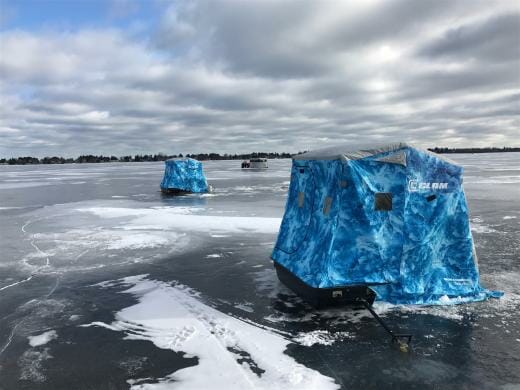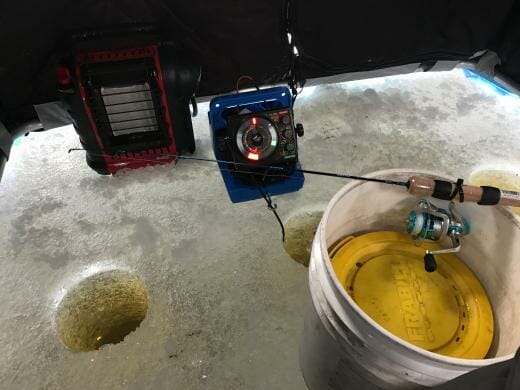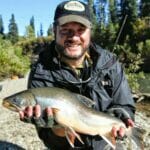The end of great day of ice fishing on the St. Louis River in Duluth, Minnesota. Brett Prettyman photo.
By Brett Prettyman
DULUTH, Minnesota — You learn a lot about someone while sharing a space the size of a row of three airplane seats for eight hours. A
dd fishing chatter to the mix, particularly slow fishing, and you practically feel like grade school chums by the end of the day.
During a recent trip to Minnesota for the Outdoor Writers Association of America board meeting, I got a chance to go ice fishing on the St. Louis River within site of downtown Duluth. Well, I could not actually see the buildings because I was sitting in a black tent with tiny plastic windows covered with flaps intently watching a fish finder for most of the time.
My companion for the day was Pete Auvinen. Pete was helping out his pal Jarrid of Houston’s Guide Service on a busy day.
It took a while for Pete and me to warm up – not to each other – just generally; we were ice fishing on a frozen river in Minnesota after all.
 alt=”” title=”” />
alt=”” title=”” />
Anglers get to know each other well when spending the day in an ice fishing tent. Brett Prettyman photo.
Over the course of the day we talked about a variety of things. The discussion, of course, turned to fishing.
He talked about fishing for perch at a favorite pond. I told him about visiting my favorite stretch of river.
“I’ve always thought about taking up fly fishing, but I already have so much fishing gear,” Pete said through a smile. “Besides I’m pretty confident fishing the way I do.”
I made a joke about how it wasn’t working very well for him on this slow day and just then the sonar showed walleye moving through. It appeared some even stopped and at least paid some attention to our lures.
 alt=”” title=”” />
alt=”” title=”” />
A heater, sonar, a rod and a bucket are required items for ice fishing. Brett Prettyman photo.
The conversation continued.
Eventually we heard a snowmobile heading our way. About the time we figured it must be somebody coming to visit the anglers turned off the machine and started to drill holes. We peaked out the fake windows. Two people were setting up rods within spitting distance of our tent.
“I guess they think the fishing must be pretty good since we are here,” I said.
“It happens all the time,” Pete responded. “I don’t get it. There is all this ice, and plenty of great places to find fish and they come right to us. The same thing happens when we are fishing from the boat.”
I told him how fly fishers also feel crowded. Sometimes while fishing a popular river here in Utah other anglers will start casting in the end of a 12-foot run while I’m fishing from the top. I usually say something about giving me room to breathe. Other times I sit down behind them and criticize their casting.
I began to wonder what other similar fishing issues Pete experienced in Minnesota and Wisconsin.
It didn’t take long for another one to come up.
He had returned to tales of his favorite perch pond.
“Some people just don’t get that if you keep all the fish you catch all the time that the fishing will eventually suck,” he said. “Other times and other places you need to keep the fish you catch to keep the population from stunting.”
I told him the same issue happens on the Utah river I mentioned previously.
About then I finally managed to hook one of the walleye that had been attempting to suck the bait off my lure without me knowing. Pete and I laughed in relief.
 alt=”” title=”” />
alt=”” title=”” />
Pete Auvinen holds a walleye caught through the ice on the St. Louis River in Duluth, Minnesota. Brett Prettyman photo.
Our day, and the discussion, ended with us talking about hot-spotting on social media and whether or not it impacts fishing.
We agreed it could impact certain waters if anglers were not careful in their posts.
I told Pete I was one of those people who look at hero pictures and try to figure out where it was taken. Not just the stream or lake, but exactly where it was snapped.
“All anglers do it,” he said.
We talked about how it must be some primeval instinct to record places of successful fishing trips in our minds so we can feed our families.
And then we reeled up the lures and walked out of the tent into the sunset. I realized maybe I should spend more time fishing with people I go fishing with rather than heading our separate ways to find fish. I’ll make it a goal.
Brett Prettyman is the Intermountain Communications Director for Trout Unlimited He is based in Salt Lake City and is currently serving as president of the Outdoor Writers Association of America. He can be reached at bprettyman@tu.org



